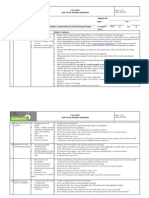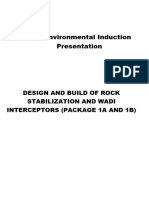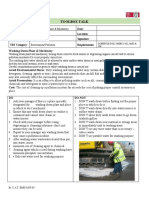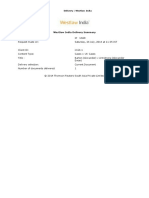Professional Documents
Culture Documents
What?: Toolbox Talks - 07. Be A Good Neighbour
What?: Toolbox Talks - 07. Be A Good Neighbour
Uploaded by
qazi mohammadOriginal Description:
Original Title
Copyright
Available Formats
Share this document
Did you find this document useful?
Is this content inappropriate?
Report this DocumentCopyright:
Available Formats
What?: Toolbox Talks - 07. Be A Good Neighbour
What?: Toolbox Talks - 07. Be A Good Neighbour
Uploaded by
qazi mohammadCopyright:
Available Formats
WHAT?
Many in the local community will regard the start of construction work in their neighbourhood with great
concern. The public are often afraid that construction work will bring noise, dust, road clo¬sures, increased
heavy road traffic and disruption to normal life.
Being a good neighbour means all those involved in a construction project acting with consideration for all
those who live and work in the area surrounding the construction site to minimise their inconvenience.
WHY?
Public image Being a good neighbour creates a positive image of the industry.
Avoid programme delays If neighbours complain to their Local Authorities about dust or noise
nuisance caused, the Local Authority can impose conditions and restrictions on working, which can lead
to delays.
Avoid prosecution If any problems being caused by dust or noise are not satisfactorily resolved the
Local Authority can prosecute those responsible.
Reduce costs If good relations can be established with neighbours, many issues such as access to
site, material deliveries and working hours can be improved through friendly negotiation.
DO DON’T
Be polite and considerate to members of the public 🗴 DON‟T obstruct vehicle accesses or
at all times driveways to neighbouring properties
Take accurate notice of any complaint made by a
neighbor and pass it on to your line manager 🗴 DON‟T obstruct public rights of way such
as pavements, footpaths, bridleways
Only use approved routes to access the site
Use only designated parking areas, if they are 🗴 DON‟T drag mud onto the roads outside
provided otherwise always park vehicles with the site - make sure vehicle wheels are
consideration for the needs of others clean before leaving
Keep dust and noise to a minimum 🗴 DON‟T trespass on neighbour‟s land
Always close any noise reducing engine covers
while plant is in use
🗴 DON‟T leave engines running unnecessarily
Direct site lighting and task lighting away from 🗴 DON‟T shout on site or have noisy radios on
neighbouring properties
Tell your line manager if rubbish bins or skips are full 🗴 DON‟T shout or whistle at passers-by
or nearly full
Notify your line manager immediately if you find any
🗴 DON‟T drop litter or leave sites untidy
flytipped waste in the area 🗴 DON‟T leave gates to the site open
TOOLBOX TALKS – 07. BE A GOOD NEIGHBOUR
You might also like
- Global Population and MobilityDocument16 pagesGlobal Population and Mobilityjocelyn vitto63% (8)
- Offer Letter: Five-Year BS-MS Dual Degree Programme (2019)Document3 pagesOffer Letter: Five-Year BS-MS Dual Degree Programme (2019)Aswin Das KNo ratings yet
- Dual Citizenship Civil CodeDocument8 pagesDual Citizenship Civil CodeDoni June Almio100% (1)
- Common Errors and Their Resolutions in Automatic Payment Program RunsDocument17 pagesCommon Errors and Their Resolutions in Automatic Payment Program RunsEmerson Carlos RochaNo ratings yet
- TBT Working in Public PDFDocument1 pageTBT Working in Public PDFHassan AbdullahNo ratings yet
- Environmental Calendar - BonusDocument2 pagesEnvironmental Calendar - BonusAsad JavedNo ratings yet
- Toolbox Talk: No1 Spill ControlDocument24 pagesToolbox Talk: No1 Spill ControlArun100% (1)
- The Purpose of This Procedure Is To Outline The SiDocument3 pagesThe Purpose of This Procedure Is To Outline The Silaevateinn laevateinnNo ratings yet
- 2010 DrvrHandbook Sect3Document40 pages2010 DrvrHandbook Sect3Stuart WhitingNo ratings yet
- Traffic Management Plan: Grenfell TowerDocument7 pagesTraffic Management Plan: Grenfell TowersafiNo ratings yet
- F412-1000.1 Safe Work Method StatementDocument5 pagesF412-1000.1 Safe Work Method StatementArafat Safdar0% (1)
- ManualDocument2 pagesManualJose Arthur AbellaNo ratings yet
- Flagman Safety: Ompp - Sa4Document25 pagesFlagman Safety: Ompp - Sa4Tayyab Hasnain Saadat JanjuaNo ratings yet
- The Redesigning of Junction: Tatya Tope Square BhopalDocument15 pagesThe Redesigning of Junction: Tatya Tope Square BhopalAr Raj YamgarNo ratings yet
- 01.3 Spill ControlDocument1 page01.3 Spill ControljeavensNo ratings yet
- Motorhome Owners Hbook 2006 (Swift)Document121 pagesMotorhome Owners Hbook 2006 (Swift)jhipkissNo ratings yet
- Methodology of Demolition: Holden Clough Primary SchoolDocument5 pagesMethodology of Demolition: Holden Clough Primary SchoolAlsayed DiabNo ratings yet
- Annex 7 - Contractor S Obligations According To Environmental and Social Code of Practice (ESCOP)Document10 pagesAnnex 7 - Contractor S Obligations According To Environmental and Social Code of Practice (ESCOP)Engr Shahin HawladerNo ratings yet
- Noise and Vibration: Toolbox Talk: NuisanceDocument5 pagesNoise and Vibration: Toolbox Talk: Nuisancejameel babooramNo ratings yet
- 25N Verge Garden GuidelinesDocument12 pages25N Verge Garden GuidelinesM PNo ratings yet
- JSADocument8 pagesJSAr afrianto100% (1)
- TBT-Driving in FogDocument2 pagesTBT-Driving in FogImran KhanNo ratings yet
- Clean Rivers Project: Northeast Boundary TunnelDocument32 pagesClean Rivers Project: Northeast Boundary TunnelScott RobertsNo ratings yet
- Nus Iance Property Enhance MenDocument2 pagesNus Iance Property Enhance MenLily M MoNo ratings yet
- What?: Toolbox Talks - 08. Washing Down Plant & MachineryDocument1 pageWhat?: Toolbox Talks - 08. Washing Down Plant & Machineryqazi mohammadNo ratings yet
- Hse Alert: Subject: Fatality Resulted As A Consequence of Reversing Vehicle PicturesDocument2 pagesHse Alert: Subject: Fatality Resulted As A Consequence of Reversing Vehicle PicturesaswinNo ratings yet
- Association RulesDocument4 pagesAssociation RulesJAGADEESHNo ratings yet
- Hazard Identification and Risk Assessment Control - Tree Cutting & Earth BallingDocument11 pagesHazard Identification and Risk Assessment Control - Tree Cutting & Earth BallingSAMUEL POBRENo ratings yet
- Best Practices For Installing Radar Sign and Camera v1.0Document4 pagesBest Practices For Installing Radar Sign and Camera v1.0tcnosolucionesNo ratings yet
- Forklift Drivers and PedestriansDocument2 pagesForklift Drivers and PedestriansLinda MaraisNo ratings yet
- Mas Hs Induction - Desert Rock-H13c23Document58 pagesMas Hs Induction - Desert Rock-H13c23hamza younasNo ratings yet
- Major Causes of Road Accidents and Remedial MeasuresDocument4 pagesMajor Causes of Road Accidents and Remedial Measurespuivgi2012No ratings yet
- Camden Council Access DrivewayDocument10 pagesCamden Council Access Driveway1229206304No ratings yet
- 1 Drainage ModuleDocument20 pages1 Drainage ModuleSaad ButtNo ratings yet
- Selection of Site For HousingDocument4 pagesSelection of Site For HousingAyshwarya SureshNo ratings yet
- 18th VCO Guide Notes April 2015Document9 pages18th VCO Guide Notes April 2015Tony JollyNo ratings yet
- MS4 City Auto Fact SheetDocument2 pagesMS4 City Auto Fact SheetkeoneulaNo ratings yet
- 7-8. Traffic Control Devices and Night Time VisibilityDocument55 pages7-8. Traffic Control Devices and Night Time Visibilityanuj sharmaNo ratings yet
- 2020 Calendar 4Document14 pages2020 Calendar 4UMASEKHARNo ratings yet
- Site Environmental Induction Presentation For Design and Build of Rock Stabilization and Wadi Interceptors (Package 1a and 1b)Document40 pagesSite Environmental Induction Presentation For Design and Build of Rock Stabilization and Wadi Interceptors (Package 1a and 1b)Vishnudas MgNo ratings yet
- Safety at Roadworks: PrinciplesDocument4 pagesSafety at Roadworks: Principlessmanoj354No ratings yet
- Ground Guiding VehiclesDocument69 pagesGround Guiding VehiclestalabiraNo ratings yet
- 2022 - 11 - 14 Template CMP Dust Noise Management V1Document22 pages2022 - 11 - 14 Template CMP Dust Noise Management V1Dan SchNo ratings yet
- FCF Minerals Corporation Operation of Roller CompactorsDocument23 pagesFCF Minerals Corporation Operation of Roller CompactorsJela ParadiseNo ratings yet
- Bollards Good Practice GuideDocument2 pagesBollards Good Practice Guidetexas_peteNo ratings yet
- Ans Sheet Construction Safety 23110Document93 pagesAns Sheet Construction Safety 23110PRATIKNo ratings yet
- Highways ReportDocument31 pagesHighways ReportRYAN ANGELO MARATANo ratings yet
- Ashok Nagar Metro Station Chennai AIC Access Audit ReportDocument44 pagesAshok Nagar Metro Station Chennai AIC Access Audit ReportDisability Rights AllianceNo ratings yet
- Man and Machine Interface ENGDocument24 pagesMan and Machine Interface ENGGiorgi KenkebashviliNo ratings yet
- Erosion and Sediment Control: A Guide For Individual Building SitesDocument16 pagesErosion and Sediment Control: A Guide For Individual Building SitesMario SandovalNo ratings yet
- Anti LitteringDocument17 pagesAnti LitteringJoemar CafrancaNo ratings yet
- 2 - Highway Location AspectsDocument9 pages2 - Highway Location AspectsOkwayenda DavisNo ratings yet
- Methodology On SafetyDocument3 pagesMethodology On SafetyLYON ENGINEERINGNo ratings yet
- BEV Proposed Rules and RegulationsDocument2 pagesBEV Proposed Rules and RegulationsKarol Joseph AbiadNo ratings yet
- Hoa Disclosure Park Lake Grove Rules & RegulationsDocument5 pagesHoa Disclosure Park Lake Grove Rules & Regulationsbreketchenelyn808No ratings yet
- Hand Book of Road Safety PDFDocument44 pagesHand Book of Road Safety PDFAshish KumarNo ratings yet
- Epoxy Flooring-Do's & Don'tsDocument1 pageEpoxy Flooring-Do's & Don'tssalesmumbai.neocreteNo ratings yet
- Northwest Territories: Flagperson'S HandbookDocument26 pagesNorthwest Territories: Flagperson'S HandbookKocic BalicevacNo ratings yet
- EP - Washing Down Plant & MachineryDocument1 pageEP - Washing Down Plant & MachineryInfinix HotsNo ratings yet
- Construction Method StatementDocument17 pagesConstruction Method StatementAddis MekuriaNo ratings yet
- Drivers Theory ExamDocument28 pagesDrivers Theory ExamAllexes DuncombeNo ratings yet
- Chennai CMBT Metro Station AIC Access Audit ReportDocument44 pagesChennai CMBT Metro Station AIC Access Audit ReportDisability Rights AllianceNo ratings yet
- Demolition Dos and DontsDocument28 pagesDemolition Dos and DontsSivaprasadNo ratings yet
- AUE4861 - 2023 - Test 3 Scenario 13 June 2023 (FDocument6 pagesAUE4861 - 2023 - Test 3 Scenario 13 June 2023 (FSphamandla MakalimaNo ratings yet
- Reserva Troncal Cases SuccessionDocument35 pagesReserva Troncal Cases SuccessionpaympmnpNo ratings yet
- Obe Phy 2105 B C Fall 2021Document5 pagesObe Phy 2105 B C Fall 2021Mizanur Rahman Azhari fan's ClubNo ratings yet
- Financing My First Car YTornero.11!17!20Document8 pagesFinancing My First Car YTornero.11!17!20Yudith TorneroNo ratings yet
- Del Monte Phil., INC vs. AragonesDocument2 pagesDel Monte Phil., INC vs. AragonesReuel GasgaNo ratings yet
- FORM-307 Rev 4 - ACI eHBL Filing Form - 014-45165131 - Data RequirementsDocument4 pagesFORM-307 Rev 4 - ACI eHBL Filing Form - 014-45165131 - Data RequirementsRidha MoussaidNo ratings yet
- RDL - E-Auction Process Information Document Dated 07-Nov-2022Document45 pagesRDL - E-Auction Process Information Document Dated 07-Nov-2022Rishabh VakhariaNo ratings yet
- J.C. Ryle On The Roman Catholic ChurchDocument6 pagesJ.C. Ryle On The Roman Catholic ChurchJesus LivesNo ratings yet
- Program of ActivitiesDocument3 pagesProgram of ActivitiesJames Domini Lopez LabianoNo ratings yet
- Case CH 12 - Anita's Apparel - MCS 3rd AssignmentDocument4 pagesCase CH 12 - Anita's Apparel - MCS 3rd AssignmentVEGA AGNITYA EKA PANGESTINo ratings yet
- CNF Report Oratory Speech Senior HighDocument4 pagesCNF Report Oratory Speech Senior HighSheryline BonillaNo ratings yet
- ACAD LineType PDFDocument3 pagesACAD LineType PDFManjunath HrmNo ratings yet
- Dirty WarDocument37 pagesDirty Wardzimmer6No ratings yet
- National PrayerDocument3 pagesNational PrayerMichael WaltherNo ratings yet
- Answer To Review Questions (Chapter 1) - Falak Jan EnayatDocument5 pagesAnswer To Review Questions (Chapter 1) - Falak Jan EnayatFalak EnayatNo ratings yet
- LCFS - Schedules - PAGES 8 TO 15Document10 pagesLCFS - Schedules - PAGES 8 TO 15Florida DelinaNo ratings yet
- PDF The Civilianization of War The Changing Civil Military Divide 1914 2014 Andrew Barros Ebook Full ChapterDocument53 pagesPDF The Civilianization of War The Changing Civil Military Divide 1914 2014 Andrew Barros Ebook Full Chaptermary.jackson983100% (2)
- Internship at Saket District Court Write UpDocument5 pagesInternship at Saket District Court Write UpSaket Subham0% (1)
- Barton V Armstrong - DuressDocument16 pagesBarton V Armstrong - DuresssoumyaNo ratings yet
- 3rd QUARTER EXAMS WEEK 10 FABM 1Document6 pages3rd QUARTER EXAMS WEEK 10 FABM 1Mikhaela CoronelNo ratings yet
- Good Advice Is Rarer Than Rubies PDFDocument3 pagesGood Advice Is Rarer Than Rubies PDFSherriNo ratings yet
- Further and Better ParticularDocument10 pagesFurther and Better ParticularGeorgina LimNo ratings yet
- 20101108005ma GermanyDocument100 pages20101108005ma GermanyVictoria CovaliNo ratings yet
- A31 Finals Pt1Document6 pagesA31 Finals Pt1dre thegreatNo ratings yet
- INVIXIUM Rebooting-a-Device-DevicesDocument6 pagesINVIXIUM Rebooting-a-Device-DevicesMarco Antonio RubinaNo ratings yet
- SLF065 MultiPurposeLoanApplicationForm V03 PDFDocument2 pagesSLF065 MultiPurposeLoanApplicationForm V03 PDFElle VillanNo ratings yet

























































































